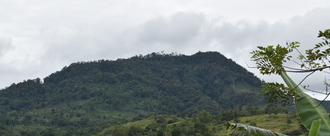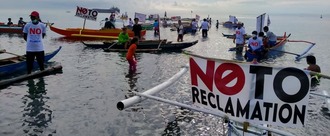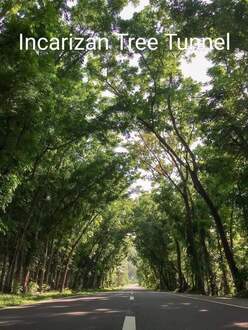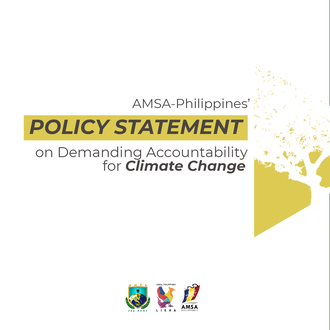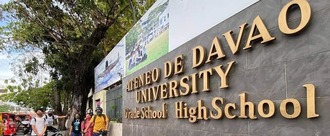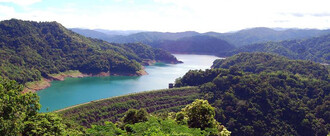-
Dear Presidential Candidate: Mr. Ernesto AbellaCurrent and dominant election narratives in the news and in social media focus on personalities and partisanship. We believe that this focus must be shifted and more space must be made for tackling issues, particularly the issues that will define the future of the planet and the fate of the youth. The #Love52 movement envisions an empowered and forceful youth voice that is demanding good governance and a better normal. “Why do we vote?” We vote to protect our loved ones, our country, and our planet. Together with various youth nationwide, we’ll seed changes in the Filipinos’ thinking about election issues, and show them that they have the power to change the narrative and move candidates to adopt the youth agenda.6 of 100 SignaturesCreated by Love, 52

-
Demolish illegal resorts, structures in Marikina Watershed!The Upper Marikina River Basin Protected Landscape is Metro Manila and Rizal Province's natural defense against the climate crisis, increasing flooding and landslides, and the loss of clean water. Despite many laws and policies that protect it from exploitation since 1904, the failure of environmental enforcement has led to a disappearing forest cover of only 11%, based on an ongoing study. If this continues, scientists predict that the watershed will only have 5% forest cover left and will ultimately lose its ability to protect Filipinos from impending disasters. Habitats of endangered trees, birds, and other biological heritage will also be destroyed.920 of 1,000 SignaturesCreated by Save Masungi Movement
-
Save Makabol Forest and Watershed in Brgy. Salaysay, Davao CityMakabol Forest and Watershed has sustained hundreds of residents for several decades already. It is also a habitat of thousands of Flora and Fauna which includes the critically endangered Philippine Eagle and other avifauna, mammals, reptiles, amphibians, invertebrates, sapling vegetation which relies on emergent dipterocarp trees and many many more. This forest is a metaphor of life and Davao City has renowned banner "Life is Here", so let it be sustained by protecting this forest and watershed. Additionally, Davao City has comprehensive watershed management code, which is totally the best if not the only option to protect this forest even if it is privately owned. Please help us with this cause and support the revocation of the logging permit. Please sign the petition and together let us save Makabol Forest and Watershed for our future generation.1,722 of 2,000 SignaturesCreated by Benito Anthony Pingoy
-
Statement of Support to the Opposition Against the Proposed 174 Hectares Dumaguete ReclamationThe proposed project will cause irreversible damage to the marine ecosystem specially that there are four marine protected areas and will directly affect the livelihood and food source of fishing communities in the area who depends on the city's coastal waters for sustenance.414 of 500 SignaturesCreated by Aidalyn Arabe
-
No to WTE incineration in Davao! Go for genuine zero waste solutions!1.) WTE incineration is known to cause health and environmental problems to surrounding communities. Burning municipal waste produces pollutants that persist in waterways, air, and surrounding farms for decades. The process creates dioxins and furans which are known to cause respiratory and reproductive diseases, birth defects, and cancer. WTE will not only harm the already marginalized low-income agricultural communities in Barangay Biao Escuela and surrounding barangays in District 1 and 3 of Davao City; its toxic by-products may reach our plates through the food chain. The proposed WTE site in Davao is located just 2.2 km from the elementary school, and 550m from a relocation site. Its impacts may also reach those living within and beyond the 10-km radius of the facility. Our fate may become similar to several cases of pollutant exposure in several parts of the world. For example, people in an urban area hosting two waste incinerators in Italy were found to have higher concentrations of metals barium, manganese, copper, and vanadium that have accumulated in their bodies (Di Ciaula et al., 2020). In Japan, children studying in schools near municipal waste incineration plants were reported to have experienced wheezing, headache, stomach ache, and fatigue (Miyake et al., 2005). Locally hired workers may also be exposed to toxins like those incineration plant workers in Shenzhen, China who were found to have high levels of phthalates and bisphenols (Lu et al., 2020). 2.) WTE worsens the climate crisis. Burning of waste releases greenhouse gas emissions. Even the European Union is defunding WTE incinerators with the realization that such facilities do not contribute to climate action. WTE also cannot be considered renewable energy because the feedstock will come from plastic waste, which are products of fossil fuel extraction. 3.) WTE is expensive, yet produces minimal energy compared to genuine renewable energy resources. Instead of reducing waste at source, it encourages production of more waste in order to feed the facility. The proposed WTE project of Davao City requires a minimum of 600 tons. At 30% residuals, Davao City wastes are only 180 tons per day: a shortfall of 420 tons. This produces minimal energy despite capital expenses reaching Php 5 billion. This will cause a huge drain on the city’s finances because of compensation obligations to the special purpose company. To make up for these arrangements, the public will shoulder the cost through payment of higher tipping fee. 4.) WTE threatens the job security of waste workers. WTE will displace workers in the formal and informal waste industry such as waste pickers, recyclers and haulers, as well as from the numerous companies and groups who upcycle, recycle and compost. 5.) WTE violates the Clean Air Act, Renewable Energy Act, and Ecological Solid Waste Management Act. The proposal also didn't undergo proper community consultation. As of writing, the project does not have an environmental compliance certificate (ECC), yet the land for the facility has already been bought by the city government of Davao. 6.) The Philippines has limited technical and financial capacity to regularly monitor emissions such as dioxin, furan, and other toxic WTE by-products. 7.) The technology proposed by Japanese contractor NSENGI is a grate stoker furnace-type, which is a relatively old waste treatment technology that is incapable of burning waste at a safe temperature. Solid by-products such as toxic ash cannot just be disposed in the municipal landfill since these are hazardous wastes. Thus, a new landfill will still be opened just for the hazardous ash from the incinerator. 8.) The establishment of WTE facilities will encourage Global North countries to dump their waste in the Philippines, a practice which still happens to this day. Davao can and should commit to genuine Zero Waste approaches and join the many other communities around the world who have committed and set Zero Waste targets. This can be done through supporting communities to properly implement the Ecological Solid Waste Management Act (RA 9003). For example, Barangay Potrero in Malabon was able to divert 80% of its solid waste from landfills through composting and recycling. This resulting in daily savings of Php 15,000 from hauling and tipping fees while generating 65 jobs. In the city of San Fernando, Pampanga, the implementation of Zero Waste has resulted to 80% waste diversion. They were also able to save Php 20 million in the process. We need not go far to find another model Zero Waste community. In Davao City's Purok Onse, Barangay Tacunan, the homeowners and the barangay, through the support of Sustainabe Davao Movement, were able to reduce the monthly volume of waste sent to the landfill by 3000 kgs, after only 7 months of implementing Zero Waste solutions such as scheduled collection of segregated waste, door-to-door collection of food waste, weekend recyclables deposit, and sari-sari store refilling stations. Still in Davao City, Barangay Mintal was able to divert an average of 2 tons of food waste per month and 6.7 tons of recyclables per month, through collecting segregated waste from food establishments and households, empowering resource collectors, and partnering with junk shops and a food upcycling company. The program also yields an average of Php 45,822 monthly income from sales of recyclable materials. We foresee that waste diversion will further improve if the LGU supports this kind of solid waste management program that is clearly safer, more productive, and more sustainable compared to incineration. These model communities in the Philippines show that Zero Waste is possible, without the polluting and costly presence of WTE incinerators.2,961 of 3,000 SignaturesCreated by No Burn Davao

-
Sagipin ang Ating Nayon!DOT, National Task Force Against Covid, and Enrique Razon of ICTSI want to make use of Nayong Pilipino Foundation urban park in Entertainment City in Parañaque for a proposed Mega Vaccination center. They say it is urgent and that the NPF board needs to sign an agreement as soon as possible. The NPF board is still waiting for detailed plans of the mega vaccination site, as it has raised concerns for the growing ecosystem in the urban park. The NPF board also raises legal concerns about the involvement of a private entity - ICTSI Enrique Razon. What is the need for the NPF urban park and green open space, when there are other existing spaces for inoculation? Since vaccination is urgent, it is more efficient to use existing structures to administer vaccination in Metro Manila. Coliseums, universities, and parking lots are excellent venues for vaccine drives. Contrary to what the DOT and ICTSI have been saying, the NPF land is not a vacant lot but has a thriving green space that hosts a variety of urban wildlife and is the last remaining grassland in the reclaimed area of Parañaque. The site is a bird flyway network and is close to the Las Piñas-Parañaque Critical Habitat and Ecotourism Area or protected wetlands under the Ramsar Convention, to which the Philippines is a signatory. See wildlife of NPF urban park here: http://nayongpilipino.gov.ph/the-birds-of-nayong-pilipino-healing-forest/ The cutting of almost 500 trees and other site works would "kill the existing ecosystem. Once lost, it could take decades to recover this ecosystem. A mega-vaccination facility that will destroy this ecosystem would be a disaster and a disservice to the residents of Metro Manila who need more green and open spaces. Our alliance is seeking transparency on the need for such a development. We also ask for Ground activities not to take place until a MOA between NPF and a government entity has been completed, and not between ICTSI. The MOA must specifically say that it is only a temporary facility that must be removed after the proposed 300 days. The MOA must also state that the ecosystem is considered in the design, and the size should just be proportionate to the needs of the facility. Private Entities Cannot Use Government Land The Nayong Pilipino Creative and Cultural Hub is owned by the Nayong Pilipino Foundation, a Government-Owned and Controlled Corporation under the Department of Tourism. It has its own charter and mandate. There is no official, written agreement between the NPF, DOT, IATF, and any private entity regarding its conversion into a mega-vaccine facility. The legality of this conversion must be reviewed against Presidential Decree No. 1445 the Government Auditing Code of the Philippines so as to ensure that this public property will not be land-grabbed. Even Architect and Urban Planner Felino “Jun” A. Palafox of Palafox Associates, was engaged by ICTSI Foundation to design the proposed mega-vaccination center. Palafox has voiced his reservations on the construction of a Mega-Vaccination facility at the NPF Creative and Cultural Hub because: 1.) The land cannot handle medical waste and 2.) It would require the removal of more than 450 trees onsite. We must save the Nayong Pilipino Creative and Cultural Hub as an urban, green, and open space. This is not about choosing trees over people's lives. People need trees to thrive, not the other way around. Metro Manila needs more green spaces. And if we truly want to end the pandemic, biodiversity matters now more than ever.577 of 600 SignaturesCreated by Alyansa ng Bagong Nayon Natin

-
STOP the cutting of trees along Bacolod Old Airport, Araneta st.Trees are important. They do not grow in an instant, even if we plant hundreds of seedlings we sould not compare the benefits of a full grown tree from seedlings because no one can buy time to grow these trees.109 of 200 SignaturesCreated by Jeffrey Lazaro
-
Save Incarizan Tree TunnelTrees are important, it took a lot of years for them to grow and they will not be easily replaced even if we plant new seedlings because of Frequent Typhoons coming in Bicol Region.2,194 of 3,000 SignaturesCreated by Carmela Diane Doma

-
Demanding Accountability for Climate ChangeIntroduction: In the face of a pandemic, climate change remains to be one of the defining issues of our time. Some of the impacts already evident in the Philippines include decreased water availability, extreme heat, and stronger, more frequent typhoons. The series of typhoons that recently hit the country and the destruction that it left behind verifies the authenticity of climate change. The Philippines is the most vulnerable to climate-related events. Unfortunately, the present pandemic has only managed to further cripple the health sector and expose the discrepancies of the nation’s response. Climate change significantly affects the environment, economy, and healthcare system of the country. It disproportionately affects vulnerable populations (elderly, children, indigenous communities, women, and coastal populations) and low-income and middle-income countries, leaving them victims of climate emergencies and placing the burden of disease on those least responsible. Maintaining vigilance about this issue allows communities to take action on attainable goals and preempt future difficulties that this country has yet to confront. AMSA Philippines’ Position As a national organization that places health at its forefront, the Asian Medical Students’ Association - Philippines believes that it is time to declare a climate emergency follow-up on the climate change framework following the recent declaration of Climate Emergency by the Congress. Climate change is not only bounded by the ruination caused by extreme climate events. The extent of human contribution to its modernization and aggravation should also be scrutinized. In actuality, various repercussions also need to be factored in such as the loss of livelihood, the dramatic increase in mental health problems, and a shortage of basic needs such as food and water. This statement is to address the insufficient measures that the government is implementing to build a more disaster-resilient country and its enforcement in imposing stricter environmental regulations to major climate change contributors in this country. Furthermore, other stakeholders are called to further engage themselves to this aim. Currently, it appears that the national government — which are responsible for implementing policies, mobilizing efforts, and exhibiting strength through its dedication to climate policy and institutional reform agenda on climate change adaptation, mitigation, and disaster risk reduction (CCAM-DRR), does not fully understand the importance of anthropogenic accelerated climate change and how much it gravely impacts us. Climate change goes beyond extreme climate events (ECEs). Climate change, together with processes like urbanization and environmental degradation have impacts on food and nutrition security, agriculture, community-based disaster risk reduction, mental health and so much more. The environment is continuously threatened, primarily by the actions of big corporations that exploit our natural resources. It is imperative that the absence of specific measures to establish resilience to the effects of climate change be addressed and mitigate its causes to overcome the challenges of dealing with the macroprudential deficits, restoring growth, minimizing poverty. A partnership with the private and public sectors is necessary to understand the risk that requires considering not just climate change, but also current and future vulnerability and exposure. According to a report by the World Input-Output Database stated in the Healthcare Climate Footprint 2019, the healthcare sector is one of the industries that contribute to carbon emissions and plastic wastes. Healthcare’s operational emissions produce 4.4% of the total climate footprint. The healthcare sector has a vital role in protecting the health and wellbeing of populations from the impacts of climate change. Leadership, guidance, and regulatory roles from healthcare professionals have great significance with regards to health-determining factors, such as emergency planning, and recuperation in the aftermath. Therefore, as future health professionals, it is our responsibility to understand that the mechanism of the adverse effects of climate change has both direct and indirect impacts on the communities around us. Direct consequences being deaths, injuries, psychological effects, and various diseases. While the indirect consequences of disasters not only refer to the loss of primary health care, living conditions, limited or no access to administration, but also damages to health care systems regarding external infrastructure such as the provision of water and/or electricity. As evidence shows the impact of climate change, there is a need for collaboration between all stakeholders in the country, and all must work together efficiently and synergistically to save lives. We must first start by calling to action the local government units and the national government, and by working with NGOs and academic institutions to refrain from band-aid solutions and shift the climate change response into a multisectoral approach and adapt the health in all policy. This would require all stakeholders to work in a coordinated manner, in a single climate change strategy and coordinating mechanism. Lastly, the curricula of institutions at all levels, particularly in medical education, should include the health effects of climate change such as malnutrition, threats to mental health, increased respiratory and cardiovascular diseases, and infections caused by food, water, and vector-borne diseases.146 of 200 SignaturesCreated by AMSA- Philippines
-
STOP the mining operations of Austral-Asia Link Mining Corporation and Hallmark Mining CorporationWe the Church people together with the farmers, fisherfolks, youth, professionals, the academe of Davao Oriental together with our national and international advocates hereby urge Hon. Roy Cimatu, DENR Secretary, TO STOPTHE MINING OPERATIONS NOW AND TO REVOKE ANY MINING AGREEMENTS WITH AUSTRAL ASIA LINK MINING CORPORATION AND HALLMARK MINING CORPORATION BOTH UNDER THE ASIATICUS MANAGEMENT CORPORATION (AMCOR) IN MAGUM, PUJADA BAY AND SALINGCOMOT, MATI CITY, PROVINCE OF DAVAO ORIENTAL. We are also against any large-scale mining activities in the whole province of Davao Oriental, as they are apparently detrimental to nature. The Mineral Production Sharing Agreement (MPSA) was issued on June 8, 2004; hence, in 2020 they have been mining for 16 years already and still have 9 more years before the twenty- five years agreement expires! During these sixteen (16) years of mining operations, the residents of the localities have witnessed the deteriorating conditions wrought by the mining lodged between two protected areas: MT. HAMIGUITAN -proclaimed as a Wildlife Sanctuary (R.A. No. 9303) and a UNESCO World Heritage and PUJADA BAY - declared as a Protected Landscape/Seascape (R.A.7586, Executive Order no. 431 July 31, 1994). Likewise, Pujada Bay was also declared one of the Most Beautiful Bays in the world during the 15th World Bays Congress in Toyama prefecture, Japan held from October 16-20, 2019. In addition, the forested area of barangay Cabuaya in Mati City which is also located near the region was also declared a protected area as it is the natural habitat of the endangered Philippine Eagle. In Mt. Hamiguitan, the cutting of trees not excluding the pygmy forests and watershed areas, had caused forest denudation, soil erosion and siltation. The residents decried lamentations on the decreasing water supply to their communities. They were likewise saddened with the discovered wastage of cut logs left untended until they were rotten. There was also no rehabilitation nor replacement of cut trees. In Pujada Bay, researches on nutrient mapping showed its risk on eutrophication, reducing productivity and declining marine life diversity. Once more, we reiterate our main contention on opposing these mining corporations even at the onset of their mining application. Based on the study published on http://bhpbilitonwatch.net/2009/10/21pujada-hallmark-nickel laterite-project profile/, some 4,778 hectares of mining permits overlap on five major drainage water systems and watersheds which either drain to Pujada Bay or to the Davao Gulf. These bodies of freshwater are the main water supplies for the communities living within and around the area. Additionally, the Pujada region is situated on the Pacific Cordillera fault line. The 2008 report “Philippines: Mining or Food” recommended that “no mining should take place on Mt. Hamiguitan or near Pujada Bay which are centres of biodiversity with high ecotourism potential.” Under these conditions, any mining activity in the area should be strictly prohibited. The loss of forests and woodlands entails loss of species which may constitute extremely important resources in the future – not only for food but also for curing diseases and other uses. Different species contain genes which could be key resources in years ahead for meeting our needs and regulating environmental problems (Laudato Si # 32). With their extinction, they will no longer give glory to God in their very existence nor convey their message to us. People have no such right! (Laudato Si # 33). The Philippines is one of the 17 richest countries in the world in terms of biodiversity; with more than half of it, found nowhere else on earth! In the final report: Philippine Biodiversity Conservation Priorities (2002), there was an appeal to take action now...“We are simply running out of time to meet the biodiversity crisis” Researches done by DOSCST have shown decreasing diversity indices of the different species on both Mt. Hamiguitan and Pujada Bay (2017- E 17; 2015 P8). Studies on Blue Carbon Stock Assessment (2016- D 4; 2017, D 5; 2019- E-22) have also shown that coastal vegetative habitats including sea grass resources capture carbon up to 70% in the marine realm; hence part of this threatened biodiversity is a crucial potential climate change mitigation and adaptation strategy! Because of the dire conditions of Philippine biodiversity, Eugene Linden (Environmental Journalist) and John Terbough (Plant Ecologist) assessed that our country was already being damaged beyond repair. But the DENR and the Biodiversity Management Bureau (BMB) still believe that there is still a small window of opportunity through urgent conservation action... “To stem the tide of destruction before a point of no return is reached.” (Theresa Mundita Lim, Treasures of Philippine Wild, 2014 by BMB and DENR). From the start of their existence, these mining firms have been existing illegally in violation of the Philippine Mining Act of 1995 (R.A. 7942) Chapter III Sec.19 f – “Areas closed to Mining Applications include ‘old growth or virgin forests, proclaimed watershed forest reserves, wilderness area, mangrove forests, national parks, provincial/municipal forests, parks, greenbelts, game refuge and bird sanctuaries’ as defined by law and in areas expressly prohibited on the National Integrated protected Area system (NIPAS) under Republic Act No 7586, Department Administrative Order No. 25, series of 1992 and other laws.” Damages had been done and ‘the dangerous point of no return’ might be reached if mining operations are not stopped now. We ought to remember that the environment can exist without us but we can never exist without the environment. We have only one common home: planet Earth and there is no other.51 of 100 SignaturesCreated by Diocese of Mati

-
Save Trees, Save LivesA petition that condemns the plan to cut down eight trees, mostly Narra trees, along the sidewalk of Ateneo de Davao University Grade School in Mc Arthur Highway to give way for a layby or road widening. With the current situation of our city where our Urban Heat Index is increasing, it is of utmost importance to have trees in the roads or parks to allow walkability and decrease heat and pollution in the city.152 of 200 SignaturesCreated by Interfacing Development Interventions for Sustainability Inc.

-
Pay the 7 months delay in salaries of Bantay Gubat Rangers from Ipo WatershedThe Bantay Gubat of Ipo Watershed are the forest rangers who roam the 6,600 hectares of Ipo Watershed to protect it against deforestation which is very rampant in the area. While the Ipo Management Plan was still pending for approval, a Memorandum of Agreement dated September 2014 between MWSS and DENR was made wherein MWSS agreed to hire selected members of the People’s Organizations (POs) as Bantay Gubat to assist in forest protection and anti-illegal logging operations. Furthermore, it was stipulated that the DENR will be responsible for the deputization and day to day supervision of Bantay Gubat while the MWSS, through the water concessionaires shall provide funds for the payment of their salaries. Each Bantay Gubat was hired without individual job contract which was signed by them. Since the time they were hired, the salary that they received was delayed by almost one (1) year from the MWSS. There were also no fringe benefits such as SSS, PhilHealth and even insurances that were very essential considering their job as forest rangers involves imminent danger on their lives. Moreover, these Bantay Gubat failed to received equipments and uniforms from the MWSS that were necessary to carry out their function as forest rangers. They left themselves unarmed and defenseless patrol of the 6,600 hectares of Ipo Watershed against the high powered gun of illegal logging syndicates. In fact, sometime in May 2017, a group of 60 men armed with guns and rifles surrounded a group of Bantay Gubat when they were doing their rounds near Sitio Ilas and Sitio Lubog in Barangay Puray, Rodriguez, Rizal. Hence, it was decided by the MWSS with the help of DENR to hire additional Bantay Gubat, therefore, increased from 23 members to 91 members. However, the MWSS is still delayed in paying them their below-minimum wage salaries. As of this writing, no TWG or even implementation of Ipo Watershed Management Plan and Supplemental MOA was done. Despite several meetings done and complaints filed before the MWSS pertaining to the delayed salary of Bantay Gubat, the problem remains unheeded and unaddressed. Since the time the MWSS hired the Bantay Gubat, there is no individual employment contract indicating the terms and conditions of employment as required under the Civil Service Rules and COA. In fact, even PENRO Emelita Lingat notice the same during the meeting held on December 6, 2018. The Bantay Gubat should be paid at least once every two (2) weeks or twice a month pursuant to Article 103 of P.D. 442 otherwise known as the “Labor Code of the Philippines”. The processing of salaries of the Bantay Gubat done at bulk every four months is, up to this day, a clear violation to the labor standards. The MWSS should observe compassionate and social justice towards the Bantay Gubat. Hence, when conflicting interests of labor and capital are to be weighed on the scales of social justice, the heavier influence of the latter should be counter-balanced by sympathy and compassion the law must accord the underprivileged worker. In view of the afore-said policy, the MWSS had a solemn obligation to assist and provide the Bantay Gubat a membership with Social Security System, PhilHealth and other insurances considering their duties as forest rangers involve the assumption of risks. Even the law dictates the afore-said requirements, the MWSS failed to act on that matter and neglect their duties to the Bantay Gubat. MWSS through Watershed Division failed to act on this matter and fell deaf ear to the pleas of Bantay Gubat. Moreover, MWSS failed to immediately facilitate the Ipo Watershed Management Plan which was pending for almost nine (9) years from 2011 up to the present. The Bantay Gubat are considered as “modern heroes” as they protect the Ipo Watershed, the source of Metro Manila’s drinking water. They risk their lives so that millions of Filipino could have an adequate supply of potable drinking water. Hence, the Bantay Gubat do not deserve this labor discrimination and abuse. Without these modern heroes the deforestation in Ipo Watershed will be more rampant and most of the mountains within will be totally denuded. If this happen, there would be a water shortage in Metro Manila and millions of Filipinos will be affected especially this time of pandemic when water is essential.57 of 100 SignaturesCreated by Forest Watch Philippines



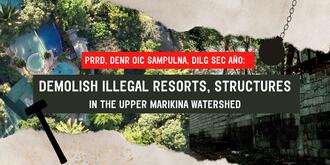.jpg)
